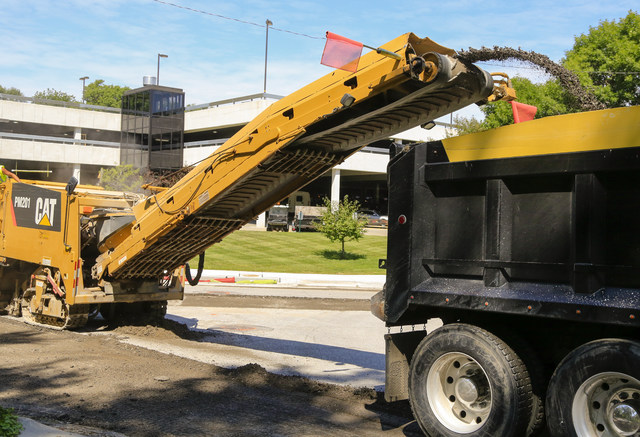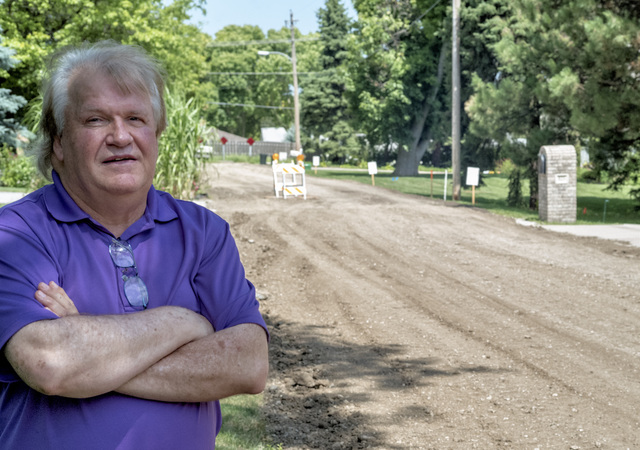One city’s answer to pothole complaints: new dirt roads

ASSOCIATED PRESS
The surface of a street in Omaha, Neb., was ground down on Aug. 5 before a planned resurfacing. On some streets where the asphalt surface was deemed too far-gone to repair, city policy used to be to grind out the asphalt and replace it with gravel.

ASSOCIATED PRESS
Lowell Frederes posed for a photo along 113th Street in Omaha, Neb. on Aug. 10. The city had ground-up the asphalt surface of the street saying it was beyond repair and replaced it with a gravel road.


OMAHA, Neb. » For miles and miles Omaha stretches on, one tidy, suburban-style neighborhood after another filled with modern low-slung houses set on spacious lawns with towering oaks and elms.
It’s a model of comfortable mid-American living, with one unusual exception: thanks to a quirk in how Omaha developed, about 300 miles of streets in these nice neighborhoods are pitted with potholes almost big enough to swallow an SUV.
The bad roads have been both an anomaly and a source of complaints for years. But recently, they’ve become the center of a mini-crisis after local officials began dispatching crews to tear up the asphalt in the neighborhoods and turn the streets back into dirt roads, much like what existed in the city’s frontier days.
The sudden appearance of miles of dirt road in the midst of urban Omaha has prompted angry protests by residents and showcased a conflict over the public services homeowners should expect when a modern city outgrows some of its old real estate agreements.
“No letter, no notice. We just came home on a Tuesday, and our street was ground up,” said Joe Skradski, a dentist who lives on 113th Street, where a dozen $400,000-and-up houses now line a dirt path. “Since then, it’s been nothing short of a nightmare.”
Nearly every U.S. city faces a backlog of needed roadwork as streets built decades ago wear out, but the situation is especially vexing in Omaha, a sprawling city of 435,000 people with 4,800 miles of road and not enough tax revenue to maintain them.
Don't miss out on what's happening!
Stay in touch with breaking news, as it happens, conveniently in your email inbox. It's FREE!
Decades ago, a number of developers sought permission to lay down asphalt roads rather than longer-lasting concrete in several sections in the middle of town, and to skip installing curbs and gutters preferred by the city. The city agreed, with the understanding that homeowners be responsible for occasional repaving. Some substandard roads also were in areas once outside the city but that were later annexed.
For years, the arrangement held up. But as the roads began to age and crumble, and as new residents replaced the original homeowners, resentment intensified about a city government that maintained some neighborhoods while ignoring others.
Said neighbor Bill Manhart, “It’s like living in the country, but in the middle of the city…There’s so much dust and mud on the street, what’s the point?”
A series of meeting between city officials and residents of the affected neighborhoods, which include about 10,000 houses, hasn’t resolved the problem.
“This is insanity,” declared City Council member Chris Jerram at one heated council session earlier this year.
Austin Rowser, Omaha streets superintendent, said the city’s position is “a matter of fairness. Some property owners paid for better streets and a minority didn’t.”
He added that the city simply can’t afford the roughly $300 million bill to fix all the substandard streets.
That doesn’t fly with residents who say that dirt roads or crumbling pavement are unworthy of a well-off community with a growing population, a tiny unemployment rate and four Fortune 500 companies.
“Well, gee whiz, if I’m going to be on a gravel street, I don’t think they should increase my taxes,” said resident Terry Hexum, referring to a recent tax assessment hike that would generate revenue for the entire city. He helped organize a protest meeting attended by 200 people about the street dispute.
Officials have suggested that neighbors create a district to finance repaving, or the more expensive option of rebuilding the streets to city standards, which the city would then maintain.
But when no agreement was reached, city officials dispatched its bulldozers, saying dirt roads were better than deteriorating asphalt.
It was not the solution residents were hoping for.
Signs went up denouncing Mayor Jean Stothert and other city officials, and one businessman filed a lawsuit that sought to force the city to repave the road in front of his $1.8 million home.
“So, they say it’s not their road,” said Manhart. “My question is: When did it become theirs to take, and when did it become ours to fix?”
Last month, Stothert announced the city would stop the dirt road conversions, would try to set aside more money for repairs and offered to pay half the cost of repaving three stretches of roads that had prompted some of the heated complaints. It was enough to get businessman Bruce Simon to drop his lawsuit, but no one has come up with a funding plan that would fix all the rough road.
According to urban planners, the dispute is a case study in how short-term deals that cities make about seemingly minor issues can backfire when the cities and circumstances change.
Dan Piatkowski, an assistant professor of regional planning at the University of Nebraska, said the dispute is also forcing residents to think about what they get from government. This is especially useful, he said, in a conservative state like Nebraska that is skeptical of government spending.
Many conservatives believe “smaller government is better, but we still want our roads to function,” he said.
17 responses to “One city’s answer to pothole complaints: new dirt roads”
Leave a Reply
You must be logged in to post a comment.




Sooooo, they want to have their cake and eat it too?
STOP ORGANIZED CRIME!!!
VOTE OUT ALL INCUMBENTS!!!
The issue at hand here is one of far-flung suburban neighborhoods that, as time has worn on, are unsustainable in terms of their sprawl and the maintenance cost for roads required to service such sprawl. It is time to design neighborhoods with a requisite amount of infrastructure-to-people ratio. Another mostly-in-America problem: vast bedroom communities.
The problem is there are not enough taxpayers left to pay for repairs in this “entitlement” society.
bwahaaaahaaaaaaa
I have predicted dirtroads for Hawaii for a long time. Contrary to the phony claims of Caldell our rads are only getting worse. After the election the road repair will stop. In Kaneohe I noticed that in our neighborhood narrow short sideroads which had no potholes get repaved while the wider more used roads are left deteriorating. I suspect that Grace Pacific gets paid by the single “lane” and makes more profit to do the easier one.They started to prepare to repave Ka Hanahou Circle and after I inquired why and told the City there are no potholes they abandoned the repaving – after they had lowered and covered the manhole covers with asphalt to prepare for repaving they dug them out and raised them again to level with the pavement. Something very foul is happening here and should be investigated.
The City recently repaved our roadway even though it didn’t need to be done because the roadway was already repaved about a year ago.
Why are we paving so many private roads?
Live in a gated retirement community and we are responsible for road maintenance. Periodically slurry is applied to restore the sheen. Being gated and traffic being limited to passenger cars, plus utility vehicles our streets have fared well over the 24 years we have lived here.
As pointed out in a Star-Advertiser article (Oahu behind the times, road repair experts say, February 8, 2016), the real problem is that the C & C of Honolulu and the state road maintenance efforts are poorly managed. That article describes simply preventive maintenance methods, like applying slurry to cracks, and the reactive rather than pro-active approach to repaving and repair of roads. Not mentioned in the article are two glaring causes of poor roads on Oahu. First, repaving is done on a short-term basis. The repaving of Beretania St. is a glaring example of this short-term, band-aide approach. The original specifications called or removing the old pavement and the road base to the proper depth; however, once the contractor found many pipes and utility lines at less than the required depth, the contract was voided and the specs rewritten. It took over a year and a half to get the job restarted, but did the new contract call for doing the work the way it should be done? No. The old pavement was stripped to a minimum depth just to get the work done, while the city acknowledged that the work would have to be done properly in a few years “when the money would be available.” The second problem is that repaved streets are often chopped up shortly after they are repaved. For example, there are at least a dozen large patches on Waialae Ave. from about 10th St. to 15th St. That utility work was done less than 8 months after Waialae Ave. was repaved. Talk about planning! Oh, one more thing: Are the developers in Kakaako paying for the repaving necessitated by the utility work associated with their ugly high-rises?
Watch that road turn into a mud pit after the first heavy rains. We see a lot of dirt roads here in the country on the neighbor islands, and most of those people living there own four wheel drive pickup trucks.
This is what happens when republicans get in. Back to the past, when life was so much simpler and dirt roads. Thank God I live in a Blue state. What was Eisenhower thinking of?
This is where Caldwell is headed, always broke.
How can such a state happen in the hometown of a noted billionaire?
Omaha has the same problem as we do private roads that require repavement. Omaha originally decided not to do the repavement and later said they would pay one half. Kirk Caldwell volunteered to repave all private roads. Why, I don’t know. Oh, he wants votes and to give our money to contractors.
Ah, there’s nothing like the sound of gravel hitting the bottom of the car; music to my ears.
The 2016 Hawaii State Senate introduced Bill SB2372, which would force the counties to accept private roads not maintained by anyone. Did that bill ever pass? I hope not.
Dusty high traffic roads probably violate Federal air pollution laws. Omaha could be in for trouble for grinding up roads which don’t even belong to the City.